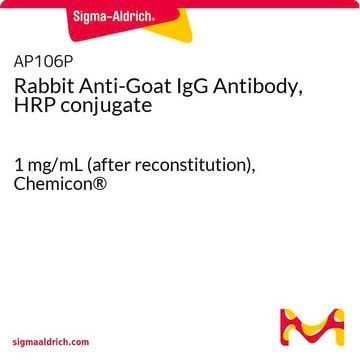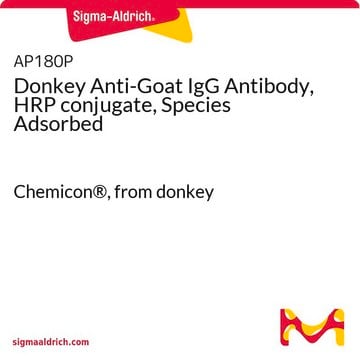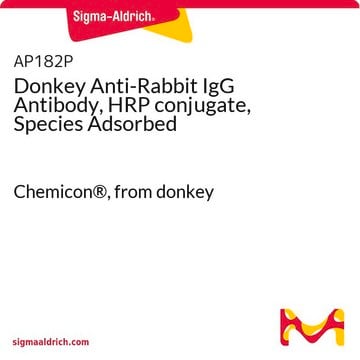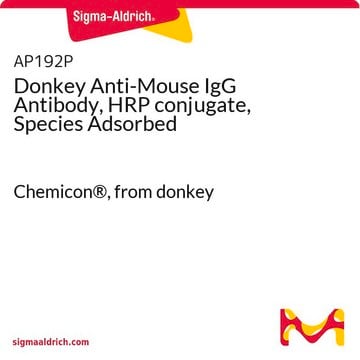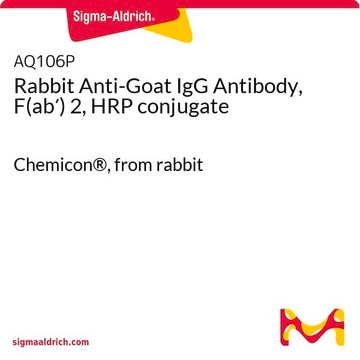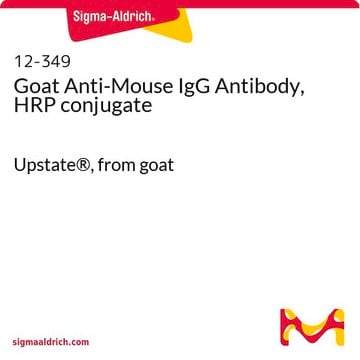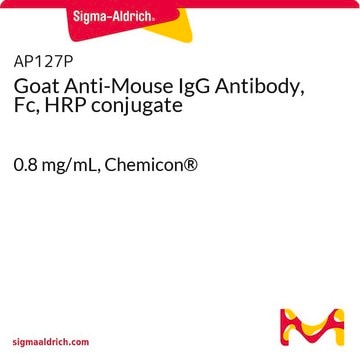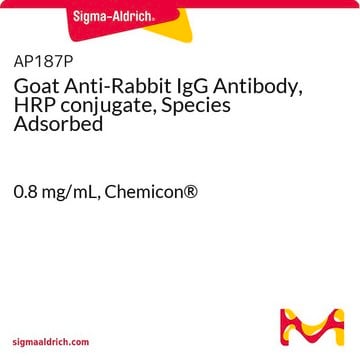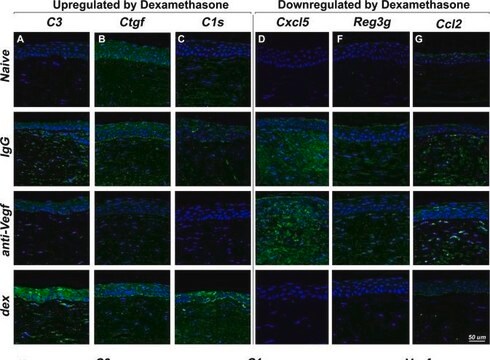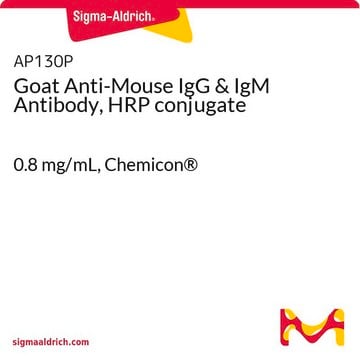AP186P
Mouse Anti-Goat IgG Antibody, HRP conjugate, Species Adsorbed
Chemicon®, from mouse
Sign Into View Organizational & Contract Pricing
All Photos(1)
About This Item
UNSPSC Code:
12352203
eCl@ss:
32160702
NACRES:
NA.46
Recommended Products
biological source
mouse
Quality Level
conjugate
peroxidase conjugate
antibody form
F(ab′)2 fragment of affinity isolated antibody
antibody product type
secondary antibodies
clone
polyclonal
species reactivity
goat
manufacturer/tradename
Chemicon®
technique(s)
ELISA: suitable
western blot: suitable
shipped in
wet ice
target post-translational modification
unmodified
Application
Research Category
Secondary & Control Antibodies
Secondary & Control Antibodies
Research Sub Category
Secondary Antibodies Adsorbed for Dual Labeling
Secondary Antibodies Adsorbed for Dual Labeling
This Mouse anti-Goat IgG Antibody, HRP conjugate, Species Adsorbed is validated for use in ELISA, WB for the detection of Goat IgG.
Legal Information
CHEMICON is a registered trademark of Merck KGaA, Darmstadt, Germany
Disclaimer
Unless otherwise stated in our catalog or other company documentation accompanying the product(s), our products are intended for research use only and are not to be used for any other purpose, which includes but is not limited to, unauthorized commercial uses, in vitro diagnostic uses, ex vivo or in vivo therapeutic uses or any type of consumption or application to humans or animals.
Not finding the right product?
Try our Product Selector Tool.
Storage Class Code
11 - Combustible Solids
WGK
WGK 3
Certificates of Analysis (COA)
Search for Certificates of Analysis (COA) by entering the products Lot/Batch Number. Lot and Batch Numbers can be found on a product’s label following the words ‘Lot’ or ‘Batch’.
Already Own This Product?
Find documentation for the products that you have recently purchased in the Document Library.
Customers Also Viewed
Youhei Mantani et al.
The Journal of veterinary medical science, 74(11), 1429-1438 (2012-07-13)
Localization of Toll-like receptors (TLRs) in the exocrine glands associated with the rat alimentary tract was immunohistochemically studied using anti-TLR antibodies. TLR-2, -4 and -9 were detected in the secretory granules of acinar cells or the luminal substances of the
Youhei Mantani et al.
Anatomical record (Hoboken, N.J. : 2007), 297(8), 1462-1471 (2014-05-03)
Paneth cells (PCs) contribute to the host defense against indigenous bacteria in the small intestine. We found Paneth cell-like cells (PLCs) in the rat ascending colon, but the nature of PLCs is never clarified. Therefore, the present study aimed to
Youhei Mantani et al.
The Journal of veterinary medical science, 75(7), 939-947 (2013-03-09)
The relationship between the invasion of indigenous bacteria into intestinal crypts and the proliferation of epithelial cells was histoplanimetrically investigated in the rat ascending colon. Indigenous bacteria preferentially adhered to the intestinal superficial epithelial cells in the mesenterium-attached mucosa (MAM)
Natsumi Masuda et al.
The Journal of veterinary medical science, 80(2), 323-332 (2017-12-12)
The host defense system with lysozyme and secretory phospholipase A2 (sPLA2) was immunohistochemically investigated in rat respiratory tract under healthy conditions. In the nasal epithelium, a large number of non-ciliated and non-microvillous cells (NC) and a small number of goblet
Hideto Yuasa et al.
The Journal of veterinary medical science, 78(12), 1797-1804 (2016-09-07)
The expressions of Toll-like receptor (TLR) -2, -4 and -9 were immunohistochemically investigated in the follicle-associated epithelium (FAE), and epithelia of the follicle-associated intestinal villus (FAIV) and ordinary intestinal villus (IV) in rat Peyer's patch regions with no bacterial colonies
Our team of scientists has experience in all areas of research including Life Science, Material Science, Chemical Synthesis, Chromatography, Analytical and many others.
Contact Technical Service